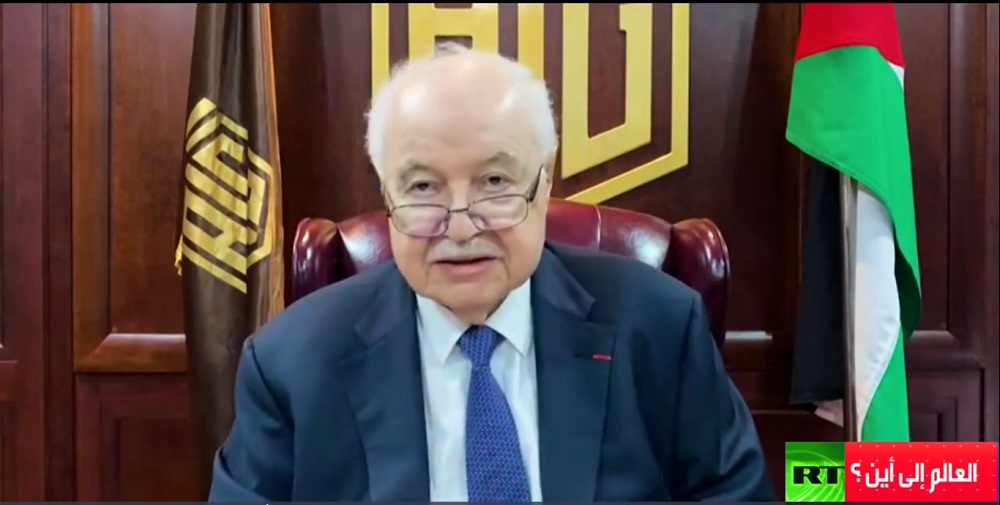Abu-Ghazaleh: World Trade Organization Faces Existential Challenge
27 Sep 2020AMMAN, In a new episode of his weekly program (The World to Where?) aired on Russia Today (RT), - Well-known economic expert, HE Dr. Talal Abu-Ghazaleh, founder and chairman of Talal Abu-Ghazaleh Global (TAG.Global), said that the World Trade Organization (WTO) is facing a future challenge represented by the Digital Trade (E-commerce), since the trading system of the Organization has always been limited to trade in services and goods.
 He asserted that the world’s five biggest corporations in the world are knowledge-digital companies, however, digital companies do not fall within the jurisdiction of the WTO, hence, the need to add a new product called ‘Knowledge Product’ to the Agreement on Trade-Related Aspects of Intellectual Property Right ‘TRIPS’ with the World Intellectual Property Organization (WIPO).
He asserted that the world’s five biggest corporations in the world are knowledge-digital companies, however, digital companies do not fall within the jurisdiction of the WTO, hence, the need to add a new product called ‘Knowledge Product’ to the Agreement on Trade-Related Aspects of Intellectual Property Right ‘TRIPS’ with the World Intellectual Property Organization (WIPO).
In addition, Dr. Abu-Ghazaleh suggested that digital technological companies should be the first entities to pay taxes due to the fact that they are the richest and the most profit-generating businesses worldwide, revealing that they are not subject to supervision and taxation until now, which necessitates changing the global tax system.
During the episode, Dr. Abu-Ghazaleh affirmed that the WTO is considered a cornerstone in the global trading system between the world’s countries since its establishment, 25 years ago, as it includes 164 member states that represent 97% of the global economy, indicating that the first aspects of trade cooperation started during the period from 1947 to 1995 through the so-called General Agreement on Tariffs and Trade (GATT) which aims to establish consensus among all countries in issues relating to tariffs and trade.
Meanwhile, Dr. Abu-Ghazaleh forewarned that the WTO is experiencing a number of obstacles considering that two thirds of its members strive to benefit from trade concessions and advantages granted to developing countries, as is indicated by the fact that China considers itself a developing country and refuses to be classified as one of the developed countries.
On the other hand, Dr. Abu-Ghazaleh disclosed one of the major problems WTO suffers from since its inception; its system works by consensus not voteing; decisions are approved by a unanimity rather than majority voting, affirming that such a principle hindered the signing of new agreements and created problems among countries in developing policies that allow new countries to join the Organization.
However, one of the major advantages of the WTO is the fact that it has its own judicial system. Dr. Abu-Ghazaleh referred to the Organization’s ‘Dispute Settlement Body’, an independent judicial authority with binding judgements, that deals with trade disputes between WTO members.
In view of that, the WTO has succeeded in resolving many trade disputes between America and Europe, yet, the Organization faces further challenges since the election of US President Donald Trump. Dr. Abu-Ghazaleh believes that this situation requires changing the global trade system in accordance with the changes of the world economic map, in addition to the necessity of reforming the WTO through collective negotiations, discussing reforms or changes as requested by each country; in other words; starting a new round of comprehensive trade negotiations.
Concerning the impact of China’s membership in the WTO, Dr. Abu-Ghazaleh said that China was one of the latest countries to join the WTO, and its admission to the Organization was unique and was preceded by a lengthy process of negotiations, noting that the accession agreement of any country is concluded on the basis of negotiations with the country’s major trading partners in the Organization.
Dr. Abu-Ghazaleh stated that China has become a key driver in the accession to negotiations and reform of the WTO; therefore, taking decisions by consensus has not become an easy task to achieve, as it requires the agreement of the two counterparts – China and the US - to pass any reform or agreement.





